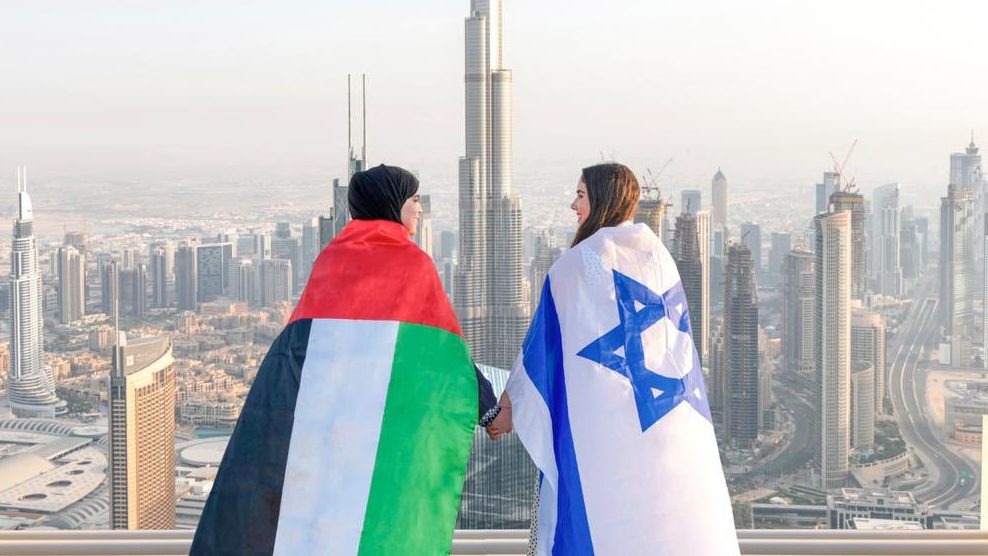UAE, Israel Normalization Could Show It’s All in Our Heads
Psychologists working in both countries team up to use ‘peace psychology’ as means for promoting regional unity
[Dubai] Psychologists in Israel and the United Arab Emirates are embarking on pioneering peace-building research to find commonality between the two nations.
Their project will be one of the first in its field to bring academics together since normalization was announced between the UAE and Israel on August 13.
Canadian Dr. Louise Lambert, of the United Arab Emirates University, and Dr. Shiri Lavy, of the University of Haifa, say it is time to bring unity to the region – and what better way than through “peace psychology.”
The academics will be looking at character strengths in young adults and ways to develop 21st-century employability skills.
Lambert anticipates they will find that young people share many of the same concerns: a desire to make their parents happy; worries about the future and living a comfortable, safe life; finding work; and wanting to be liked.
“We’re just a lot more similar than we think we are,” she told The Media Line.
We’re just a lot more similar than we think we are
According to Lambert, it is a chance for the UAE to expand its mission to becoming a “knowledge economy,” a major tenet of its vision to diversify beyond its once heavy dependence on oil.
Just as business and finance are now proving crucial means of bringing the two nations together, so can psychology, and with Israel the region’s leader in the field, she is thrilled.
“Personally, it allows me to really open up new fields of data and insight,” she said.
Israel is heavily invested in research and development, spending almost 5% of its GDP on research each year, according to the World Bank. The UAE spends around 1.3%, which, though far lower, still exceeds other Arab nations, where the average is around 0.5%.
Among the first of many such scientific partnerships flourishing across the likes of food safety and health, Lambert says collaboration in fields like psychology are pivotal in promoting peace and tolerance.
The research will utilize a tool in psychology known as the “contact hypothesis,” meaning topics of commonality such as families, life challenges and common likes and dislikes.
“We can deepen what we know about human nature, about peace psychology,” she said.
“I really want to highlight that we really aren’t that different,” she continued.
I really want to highlight that we really aren’t that different
“We share the same concerns, and when you see this in numbers in a big sample size, [and] then you publish this, it’s hard to argue with published data. The more we build and find these numbers, it becomes harder and harder to uphold the concept of ‘difference,’” she noted.
“When you start talking to people, hearing them and recognizing that they also like coffee, they have kids, too, you realize that the ‘big bad monster’ is just a person like you,” she explained.
“It shrinks the ‘other’ into human size in a way that you can interact and learn from,” she said. “In terms of [the] development of peaceful relationships, it’s through this – finding joint projects of mutual interest, interacting, learning from one another.”
It is the way to open avenues, to open a path to human connection and collaboration.
“It’s powerful for students here to see an Israeli on the screen who really just wants to make friends. The value of this is people’s understanding of the other,” she said.
“Researchers can take a bold new direction, which can have tremendous consequences,” she added. “As an academic, this is very exciting.”
Lavy agrees that such studies help reduce bias and, in turn, increase a positive disposition, overriding negative stereotypes and social conditioning. As the bias against the other is reduced, the sense of togetherness increases while the sense of threat diminishes.
“We have been wishing for a long time to connect with people in the UAE, and I and my students are looking forward to learning more about the culture [and] beliefs, as well as the commonalities and differences related to our research, such as perceptions of happiness and peace,” she told The Media Line.
We have been wishing for a long time to connect with people in the UAE, and I and my students are looking forward to learning more about the culture and beliefs, as well as the commonalities and differences related to our research, such as perceptions of happiness and peace
Cultural understanding and the building of bridges of knowledge, as well as interpersonal connections between academics and students, can help people take steps toward peace, Lavy says.
“Such processes decrease fear and increase closeness. Even if it’s a small step, it’s a start,” she stated.
After it became known that the UAE and Israel were set to normalize ties, Emirati Norah Alawadhi became internationally recognizable from a now-iconic photograph taken with Israeli Ronny Gonen overlooking the Burj Khalifa in Dubai, the two draped in their respective flags.
The photo has been shared by the likes of Ivanka Trump and Binyamin Netanyahu, and is now seen as a symbol of peace.
The two friends have come to represent the message of commonality over difference.
“It would be so interesting to see what science can tell us about each other and how common we are mentally [and] emotionally,” Alawadhi told The Media Line.
It would be so interesting to see what science can tell us about each other and how common we are mentally and emotionally
“When the connections happened with my Israeli friends, it immediately felt very natural and comfortable – effortless,” she noted. “We have so much more in common than we do separating us.”


